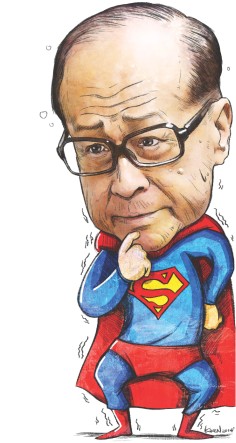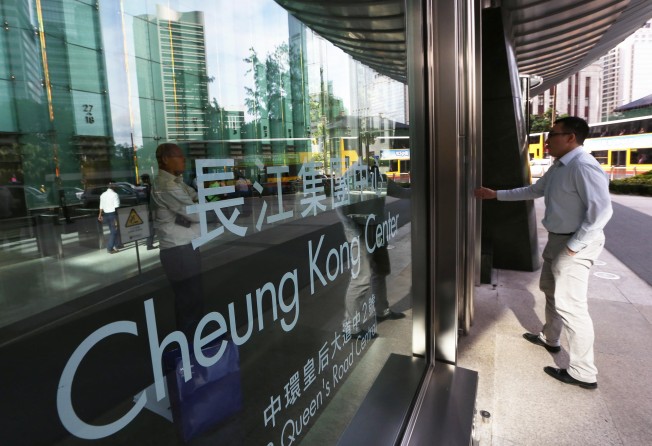
Once a bold dealmaker, Cheung Kong now dabbles in the 'unexciting'
Cheung Kong's days as a bold dealmaker are over as it shifts to dabbling in financially driven assets

There was a time when Cheung Kong (Holdings) and Li Ka-shing amazed investors with the kind of asset-stripping and bold deal-making that characterised the speculative and opportunistic glory days of Hong Kong's corporate scene.
Let's take a trip back to 1986 when Hong Kong's economy expanded by a healthy 9 per cent over the year.
Cheung Kong reported earnings of HK$1.28 billion, an impressive increase of 128 per cent over the previous year. Besides completing a number of property developments, its associate Hutchison Whampoa acquired Hongkong Electric in 1985.
Cheung Kong reorganised its business in 1986. Hongkong Electric's utility and non-utility businesses were separated. The non-utility holdings - including the Hong Kong Hilton Hotel (now the site of Cheung Kong Centre) and a 43 per cent stake in Husky Oil of Canada - were to become part of a new firm, Cavendish International Holdings. But, probably the most lucrative move was the development of Cavendish Heights, which was Hongkong Electric's former senior staff quarters in Jardine's Lookout.
The huge profits from that cluster of luxury high-rises that tower above Jardine's Lookout probably paid for the entire acquisition cost of Hongkong Electric. It effectively gave Li a free electricity utility and monopoly.
Those boom days have receded into Hong Kong's corporate folklore and the city doesn't offer such easy pickings for its new generation of entrepreneurs. Today, Hong Kong is a low-growth and low-opportunity economy.

Cheung Kong faces the formidable burden of investing its vast mountain of growing cash in a hostile, low-yield, quantitative-easing environment. Internationally and in China, it must compete with other funds and companies.
Like a bank or any large holder of capital today, Cheung Kong's only real competitive advantage is deal flow from supplicant investment banks and access to more cheap capital from banks more than happy to lend to its strong credit.
Historically, Cheung Kong has never really cultivated a cohesive investing or operating strategy. Rather, opportunism and speculation served it well since its founding. Any asset that could be bought cheaply and readily financed was a doable deal and favourable business.
However, with a HK$321 billion market cap, it's difficult to manoeuvre and wield any kind investment strategy that doesn't involve buying a company with vast global operations or products that require intensive management, creativity and perhaps even inventiveness. Its recent deals suggest Cheung Kong should be judged as a family-owned hedge fund.
It is no longer a unique deal-maker, but a price-taker. Buying aircraft at market prices doesn't offer much hidden or exciting value. Unlike its Cavendish deal, where Li actually extracted extraordinary value through skilful transaction, many of Cheung Kong's deals in infrastructure are part of an open bidding process where government authorities are represented by a banks and specialist consultants. Each utility asset operates as a strictly regulated monopoly so the buyer cannot realise quick profits by suddenly building luxury flats on the property.
Any ultra-high-net-worth person or family can ask their private banker to invest in structured financial products related to aircraft leasing. Does Cheung Kong's entry into aircraft financing represent any disintermediation, cyclical or secular opportunity? It's more like treasury management rather than an extraordinary investment strategy.
According to data from S&P Capital IQ, over the past five years, Cheung Kong's total return is about 37 per cent. Investors would have been better diversified and received more transparency if they invested in the S&P 500, which has returned 87 per cent over the same period.
Investors could have accomplished large-cap returns by investing in Apple. Since becoming chief executive in 2011, Tim Cook has doubled Apple's market cap to US$698 billion - no mean feat given its size and success before he took over. It shows that big growth is possible for large firms.
Cheung Kong's unexciting strategy is to find sizeable, financially driven assets that it can easily finance. Unlike Warren Buffett, who runs a strict investment methodology that compels him to buy entire large-cap, operating companies, Cheung Kong prefers to dabble in asset classes like a generous Hong Kong-style buffet.
Peter Guy is a financial writer and former international banker